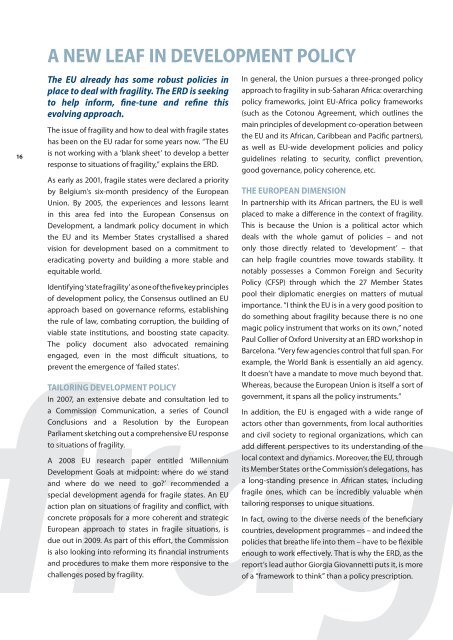overcoming fragility in africa - European Report on Development
overcoming fragility in africa - European Report on Development
overcoming fragility in africa - European Report on Development
Create successful ePaper yourself
Turn your PDF publications into a flip-book with our unique Google optimized e-Paper software.
16<br />
A NEW LEAF IN DEVELOPMENT POLICY<br />
The EU already has some robust policies <str<strong>on</strong>g>in</str<strong>on</strong>g><br />
place to deal with <str<strong>on</strong>g>fragility</str<strong>on</strong>g>. The ERD is seek<str<strong>on</strong>g>in</str<strong>on</strong>g>g<br />
to help <str<strong>on</strong>g>in</str<strong>on</strong>g>form, f<str<strong>on</strong>g>in</str<strong>on</strong>g>e-tune and ref<str<strong>on</strong>g>in</str<strong>on</strong>g>e this<br />
evolv<str<strong>on</strong>g>in</str<strong>on</strong>g>g approach.<br />
The issue of <str<strong>on</strong>g>fragility</str<strong>on</strong>g> and how to deal with fragile states<br />
has been <strong>on</strong> the EU radar for some years now. “The EU<br />
is not work<str<strong>on</strong>g>in</str<strong>on</strong>g>g with a ‘blank sheet’ to develop a better<br />
resp<strong>on</strong>se to situati<strong>on</strong>s of <str<strong>on</strong>g>fragility</str<strong>on</strong>g>,” expla<str<strong>on</strong>g>in</str<strong>on</strong>g>s the ERD.<br />
As early as 2001, fragile states were declared a priority<br />
by Belgium’s six-m<strong>on</strong>th presidency of the <str<strong>on</strong>g>European</str<strong>on</strong>g><br />
Uni<strong>on</strong>. By 2005, the experiences and less<strong>on</strong>s learnt<br />
<str<strong>on</strong>g>in</str<strong>on</strong>g> this area fed <str<strong>on</strong>g>in</str<strong>on</strong>g>to the <str<strong>on</strong>g>European</str<strong>on</strong>g> C<strong>on</strong>sensus <strong>on</strong><br />
<strong>Development</strong>, a landmark policy document <str<strong>on</strong>g>in</str<strong>on</strong>g> which<br />
the EU and its Member States crystallised a shared<br />
visi<strong>on</strong> for development based <strong>on</strong> a commitment to<br />
eradicat<str<strong>on</strong>g>in</str<strong>on</strong>g>g poverty and build<str<strong>on</strong>g>in</str<strong>on</strong>g>g a more stable and<br />
equitable world.<br />
Identify<str<strong>on</strong>g>in</str<strong>on</strong>g>g ‘state <str<strong>on</strong>g>fragility</str<strong>on</strong>g>’ as <strong>on</strong>e of the five key pr<str<strong>on</strong>g>in</str<strong>on</strong>g>ciples<br />
of development policy, the C<strong>on</strong>sensus outl<str<strong>on</strong>g>in</str<strong>on</strong>g>ed an EU<br />
approach based <strong>on</strong> governance reforms, establish<str<strong>on</strong>g>in</str<strong>on</strong>g>g<br />
the rule of law, combat<str<strong>on</strong>g>in</str<strong>on</strong>g>g corrupti<strong>on</strong>, the build<str<strong>on</strong>g>in</str<strong>on</strong>g>g of<br />
viable state <str<strong>on</strong>g>in</str<strong>on</strong>g>stituti<strong>on</strong>s, and boost<str<strong>on</strong>g>in</str<strong>on</strong>g>g state capacity.<br />
The policy document also advocated rema<str<strong>on</strong>g>in</str<strong>on</strong>g><str<strong>on</strong>g>in</str<strong>on</strong>g>g<br />
engaged, even <str<strong>on</strong>g>in</str<strong>on</strong>g> the most difficult situati<strong>on</strong>s, to<br />
prevent the emergence of ‘failed states’.<br />
TAILORING DEVELOPMENT POLICY<br />
In 2007, an extensive debate and c<strong>on</strong>sultati<strong>on</strong> led to<br />
a Commissi<strong>on</strong> Communicati<strong>on</strong>, a series of Council<br />
C<strong>on</strong>clusi<strong>on</strong>s and a Resoluti<strong>on</strong> by the <str<strong>on</strong>g>European</str<strong>on</strong>g><br />
Parliament sketch<str<strong>on</strong>g>in</str<strong>on</strong>g>g out a comprehensive EU resp<strong>on</strong>se<br />
to situati<strong>on</strong>s of <str<strong>on</strong>g>fragility</str<strong>on</strong>g>.<br />
A 2008 EU research paper entitled ‘Millennium<br />
<strong>Development</strong> Goals at midpo<str<strong>on</strong>g>in</str<strong>on</strong>g>t: where do we stand<br />
and where do we need to go?’ recommended a<br />
special development agenda for fragile states. An EU<br />
acti<strong>on</strong> plan <strong>on</strong> situati<strong>on</strong>s of <str<strong>on</strong>g>fragility</str<strong>on</strong>g> and c<strong>on</strong>flict, with<br />
c<strong>on</strong>crete proposals for a more coherent and strategic<br />
<str<strong>on</strong>g>European</str<strong>on</strong>g> approach to states <str<strong>on</strong>g>in</str<strong>on</strong>g> fragile situati<strong>on</strong>s, is<br />
due out <str<strong>on</strong>g>in</str<strong>on</strong>g> 2009. As part of this effort, the Commissi<strong>on</strong><br />
is also look<str<strong>on</strong>g>in</str<strong>on</strong>g>g <str<strong>on</strong>g>in</str<strong>on</strong>g>to reform<str<strong>on</strong>g>in</str<strong>on</strong>g>g its f<str<strong>on</strong>g>in</str<strong>on</strong>g>ancial <str<strong>on</strong>g>in</str<strong>on</strong>g>struments<br />
and procedures to make them more resp<strong>on</strong>sive to the<br />
challenges posed by <str<strong>on</strong>g>fragility</str<strong>on</strong>g>.<br />
In general, the Uni<strong>on</strong> pursues a three-pr<strong>on</strong>ged policy<br />
approach to <str<strong>on</strong>g>fragility</str<strong>on</strong>g> <str<strong>on</strong>g>in</str<strong>on</strong>g> sub-Saharan Africa: overarch<str<strong>on</strong>g>in</str<strong>on</strong>g>g<br />
policy frameworks, jo<str<strong>on</strong>g>in</str<strong>on</strong>g>t EU-Africa policy frameworks<br />
(such as the Cot<strong>on</strong>ou Agreement, which outl<str<strong>on</strong>g>in</str<strong>on</strong>g>es the<br />
ma<str<strong>on</strong>g>in</str<strong>on</strong>g> pr<str<strong>on</strong>g>in</str<strong>on</strong>g>ciples of development co-operati<strong>on</strong> between<br />
the EU and its African, Caribbean and Pacific partners),<br />
as well as EU-wide development policies and policy<br />
guidel<str<strong>on</strong>g>in</str<strong>on</strong>g>es relat<str<strong>on</strong>g>in</str<strong>on</strong>g>g to security, c<strong>on</strong>flict preventi<strong>on</strong>,<br />
good governance, policy coherence, etc.<br />
THE EUROPEAN DIMENSION<br />
In partnership with its African partners, the EU is well<br />
placed to make a difference <str<strong>on</strong>g>in</str<strong>on</strong>g> the c<strong>on</strong>text of <str<strong>on</strong>g>fragility</str<strong>on</strong>g>.<br />
This is because the Uni<strong>on</strong> is a political actor which<br />
deals with the whole gamut of policies – and not<br />
<strong>on</strong>ly those directly related to ‘development’ – that<br />
can help fragile countries move towards stability. It<br />
notably possesses a Comm<strong>on</strong> Foreign and Security<br />
Policy (CFSP) through which the 27 Member States<br />
pool their diplomatic energies <strong>on</strong> matters of mutual<br />
importance. “I th<str<strong>on</strong>g>in</str<strong>on</strong>g>k the EU is <str<strong>on</strong>g>in</str<strong>on</strong>g> a very good positi<strong>on</strong> to<br />
do someth<str<strong>on</strong>g>in</str<strong>on</strong>g>g about <str<strong>on</strong>g>fragility</str<strong>on</strong>g> because there is no <strong>on</strong>e<br />
magic policy <str<strong>on</strong>g>in</str<strong>on</strong>g>strument that works <strong>on</strong> its own,” noted<br />
Paul Collier of Oxford University at an ERD workshop <str<strong>on</strong>g>in</str<strong>on</strong>g><br />
Barcel<strong>on</strong>a. “Very few agencies c<strong>on</strong>trol that full span. For<br />
example, the World Bank is essentially an aid agency.<br />
It doesn’t have a mandate to move much bey<strong>on</strong>d that.<br />
Whereas, because the <str<strong>on</strong>g>European</str<strong>on</strong>g> Uni<strong>on</strong> is itself a sort of<br />
government, it spans all the policy <str<strong>on</strong>g>in</str<strong>on</strong>g>struments.”<br />
In additi<strong>on</strong>, the EU is engaged with a wide range of<br />
actors other than governments, from local authorities<br />
and civil society to regi<strong>on</strong>al organizati<strong>on</strong>s, which can<br />
add different perspectives to its understand<str<strong>on</strong>g>in</str<strong>on</strong>g>g of the<br />
local c<strong>on</strong>text and dynamics. Moreover, the EU, through<br />
its Member States or the Commissi<strong>on</strong>’s delegati<strong>on</strong>s, has<br />
a l<strong>on</strong>g-stand<str<strong>on</strong>g>in</str<strong>on</strong>g>g presence <str<strong>on</strong>g>in</str<strong>on</strong>g> African states, <str<strong>on</strong>g>in</str<strong>on</strong>g>clud<str<strong>on</strong>g>in</str<strong>on</strong>g>g<br />
fragile <strong>on</strong>es, which can be <str<strong>on</strong>g>in</str<strong>on</strong>g>credibly valuable when<br />
tailor<str<strong>on</strong>g>in</str<strong>on</strong>g>g resp<strong>on</strong>ses to unique situati<strong>on</strong>s.<br />
In fact, ow<str<strong>on</strong>g>in</str<strong>on</strong>g>g to the diverse needs of the beneficiary<br />
countries, development programmes – and <str<strong>on</strong>g>in</str<strong>on</strong>g>deed the<br />
policies that breathe life <str<strong>on</strong>g>in</str<strong>on</strong>g>to them – have to be flexible<br />
enough to work effectively. That is why the ERD, as the<br />
report’s lead author Giorgia Giovannetti puts it, is more<br />
of a “framework to th<str<strong>on</strong>g>in</str<strong>on</strong>g>k” than a policy prescripti<strong>on</strong>.
















